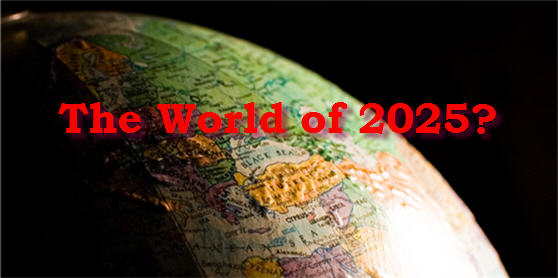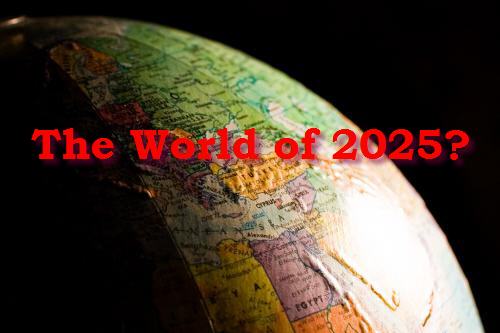
Speaking to the Atlantic Council last Thursday, CIA director Michael Hayden declared that, “although Al-Qaeda has suffered serious setbacks, it remains a determined and adaptive enemy” and vowed that, while the American people have grown naturally complacent about the threat, he and his colleagues remain vigilant every day, motivated by the fact that the country “never faced an enemy so committed to our destruction.”
Exactly one week later, Thomas Fingar, the deputy director of national intelligence and chairman of the National Intelligence Council came to the Council on the release of the unclassified “Global Trends 2025” report, which predicts that terrorism will greatly recede as an issue in the coming years.
This, from the Executive Summary, is all most who’ll talk about the findings are likely to read.
Terrorism, proliferation, and conflict will remain key concerns even as resource issues move up on the international agenda. Terrorism is unlikely to disappear by 2025, but its appeal could diminish if economic growth continues and youth unemployment is mitigated in the Middle East. Economic opportunities for youth and greater political pluralism probably would dissuade some from joining terrorists’ ranks, but others—motivated by a variety of factors, such as a desire for revenge or to become “martyrs”—will continue to turn to violence to pursue their objectives.
In the absence of employment opportunities and legal means for political expression, conditions will be ripe for disaffection, growing radicalism, and possible recruitment of youths into terrorist groups. Terrorist groups in 2025 will likely be a combination of descendants of long established groups—that inherit organizational structures, command and control processes, and training procedures necessary to conduct sophisticated attacks—and newly emergent collections of the angry and disenfranchised that become self-radicalized. For those terrorist groups that are active in 2025, the diffusion of technologies and scientific knowledge will place some of the world’s most dangerous capabilities within their reach. One of our greatest concerns continues to be that terrorist or other malevolent groups might acquire and employ biological agents, or less likely, a nuclear device, to create mass casualties. (ix)
None of that’s particularly newsworthy. The factors that have contributed to terrorism in the past will continue to do so in the future unless they don’t. And we really don’t want people who want to kill innocent civilians to get their hands on tools that make it easier to do so.
At the same time, those two paragraphs are sufficiently vague so that ideologues of all stripes can find something to buttress their preferred argument. “Poverty causes terrorism, so we need more humanitarian aid,” the Left will say, “not more military action.” “Nonsense,” those on the Right will respond, “The problem is Muslim radicals and the signs point to them becoming more radical and dangerous.”
Delving into the guts of the report, though, we get more interesting information. The issue of network effects, for example:
Future radicalism could be fueled by global communications and mass media. Increasing interconnectedness will enable individuals to coalesce around common causes across national boundaries, creating new cohorts of the angry, downtrodden, and disenfranchised. In some situations these new networks could act as forces for good by pressuring governments through non-violent means to address injustice, poverty, the impacts of climate change, and other social issues. Other groups, however, could use networks and global communications to recruit and train new members, proliferate radical ideologies, manage their finances, manipulate public opinion, and coordinate attacks. (68)
Also of note is a sidebar discussion titled “Why al-Qa’ida’s ‘Terrorist Wave’ Might Be Breaking Up” (69-70). It condenses some social science research, notably David Rapoport’s work, and concludes, “Al-Qa’ida’s weaknesses—unachievable strategic objectives, inability to attract broad-based support, and self-destructive actions—might cause it to decay sooner than many people think.” It turns out that asymmetric warfare, just like any other type of warfare, is ultimately fought to achieve political objectives rather than military ones. As in conventional warfare, killing the enemy is a means, not an end.
Research shows that Muslims want — surprise — jobs, education, and decent government. And while lack of those things makes terrorist recruitment easier, there’s little confidence in the Muslim world that al Qaeda and its brethren will be able to deliver those ends. Likewise, while radical Islamist rhetoric can fire up suicide bombers, “harsh pan-Islamist ideology and policies appeal only to a tiny minority of Muslims.” Oh, and it turns out that a rate of 40 percent Muslim “collateral damage” is not helpful in winning hearts and minds.
On the down side, however, the diffusional of technology and information is making it easier for small, motivated cells to wreak havoc.
The globalization of biotechnology industries is spreading expertise and capabilities and increasing the accessibility of biological pathogens suitable for disruptive attacks. Radiological and chemical weapons may also be used by terrorists or insurgents seeking an advantage against opposing security or military forces and to create mass casualties. (70)
So, it’s quite likely that the terrorists will lose the war — in the sense of failing to achieve their political aims — and yet grow more capable of killing innocents. This state of affairs has been unfortunately termed by Senator John Kerry and others as reducing terrorism to a “nuisance.” It also happens to be, as of June 2008, our National Defense Strategy. It’s likely as close as we’ll get to “victory” in the war on terrorism.
And, of course, as Fingar emphasized repeatedly in his talk last night, none of this is deterministic. While al Qaeda is on a downward spiral in terms of its appeal in the Muslim world and its ability to achieve its aims, Hayden and his intelligence community colleagues are absolutely right to have the mindset that today is September 12, 2001.
James Joyner is managing editor of the Atlantic Council. Photo by Flickr user ToastyKen modified by the author under Creative Commons license.
GLOBAL TRENDS 2025 SERIES:
- Global Trends 2025: A Transformed World
- NIC Chairman Thomas Fingar Presents “Global Trends 2025”
- Predicting the Future is Hard – And Necessary – James Joyner
- U.S. Dominance Ending – James Joyner
- Terrorism Here Today, Gone Tomorrow? – James Joyner
- Asia’s Ascendency Seen in Intelligence Forecast – Joseph Snyder
- Climate Change Will be More Severe in 2025 –Erica McCarthy
- Economic Rise of the East – James O’Connor
Image: globe-2025_1.jpg
